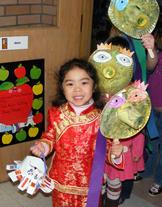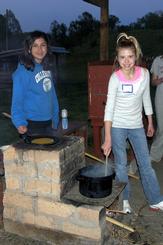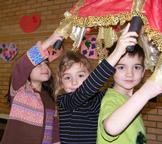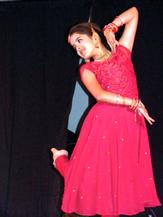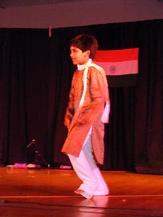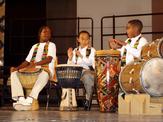Topeka Collegiate is a welcoming and inclusive community that cultivates academic excellence, sound character and enthusiastic collaboration to prepare our students for life-long learning, service and global citizenship. We provide educational enrichment through listening, discussion and positive exchange of ideas.
On June 5, we solidified our long-standing commitment to inclusiveness and equity by pledging to serve as a partner, convener and place where critical conversations are shared for the greater good. Black Lives Matter. The full statement is available here.
During Summer 2020, in addition to typical curriculum review, our faculty has begun intentional conversation to add anti-racism instruction into classrooms at all levels. Literature lessons in the Topeka Collegiate library also will incorporate anti-racist lessons at both lower school and middle school.
School Diversity
Members of our school families represent the broad diversity - geographic, socioeconomic, racial and religious - of our city:
- 39% represent diversity of race, country of origin and culture
- 39% receive financial aid
- 51% are male
- 49% are female
Our school families also represent many religious traditions including Christian, Muslim, Hindu, Jewish and Buddhist.
Equity and Justice Committee
The Board of Trustees has included an Equity and Justice Committee for many years. If you are interested in joining this crucial conversation as a committee member, please contact Trustee Kareem Thomas, committee chair, by calling the school at 785.228.0490 or emailing sayhello@topekacollegiate.org.
Independent schools, including Topeka Collegiate, are founded on humanitarian values. Learn more about the National Association of Independent Schools Principles of Good Practice – Equity and Justice.
Professional Development
We believe that educators and all community members benefit from frequent professional development in the area of equity, justice, and diversity. To learn more about this topic, click HERE to visit the Teaching Tolerance website for suggestions, conversations, and support.
Resources for Families
We offer these resources as a place to start, recognizing each of us has a role to play in ensuring our school and our community at large are inclusive, supportive, and actively anti-racist. We will update these resources and welcome your recommendations.
For parents and caregivers:
Books:
- 15 Powerful and Essential Books on Racial Injustice to Add to Your Reading List
- Race and Policing | University of California Press
Podcasts:
- Parenting Forward podcast episode ‘Five Pandemic Parenting Lessons” with Cindy Wang Brandt
- Gretchen Rubin: Podcast 278: Why We Should Do Something, and a Conversation with Sofy Solomon about Lessons from Safer-at-Home in a Childhood Bedroom—and How to Make Systems More Just.
Articles:
- How and why to talk with your child(ren) about racism: How White Parents Can Talk to Their Kids About Race | NPR
- Teaching Your Child About Black History Month | PBS
- Your Kids Aren't Too Young to Talk About Race: Resource Roundup from Pretty Good
- My 11-Year-Old Got Called The N-Word. White Parents, Talk to Your Kids About Racism | Laura Cathcart Robbins
Understand White Privilege:
- White Privilege: Unpacking the Invisible Knapsack | Peggy McIntosh
- Who Gets to Be Afraid in America? | Ibram X. Kendi
Resources for you and your children:
Wondering how to start in your search for picture books for your child? EmbraceRace.org offers eight tips for choosing “good” picture books featuring diverse, BIPOC characters, as well as some advice:
“If you’re an adult who understands the importance of seeking out picture books that feature Black and Indigenous people and People of Color (BIPOC), it can still be challenging to know how to choose a good book from among what’s available on the “diverse books” market. Avoid books with stereotypical or negative portrayals, and to seek books by authors/illustrators who share an identity with the characters in the book."
1. Choose a compelling book & consider your audience.
2. Include books in which BIPOC characters are the stars.
3. Scaffold your approach when introducing new material.
4. Consider the experience and/or expertise of the creators, especially when assessing a book that explicitly explores human difference(s) (Beautiful Life and Folklore).
5. Look for books that depict positive interactions across differences (Cross-Group).
6. Aim for a balanced set of portrayals.
7. Feel free to wear a critical lens while reading any book.
8. Do ongoing research.
More books for children and teens:
- Coretta Scott King Book Award Winners: books for children and young adults
The Coretta Scott King Book Awards are given to outstanding African American authors and illustrators of books for children and young adults that demonstrate an appreciation of African American culture and universal human values. - 37 Children’s Books to help talk about Racism & Discrimination
- 50 Inspiring Books on Girls and Women of the Civil Rights Movement
- 75 Books about Extraordinary Black Mighty Girls and Women
- 150 Books Celebrating Black Boys
- Books to Teach White Children and Teens How to Undo Racism and White Supremacy
Do you have feedback about the content provided on this page? If so, we want to hear from you! Email sayhello@topekacollegiate.org.


